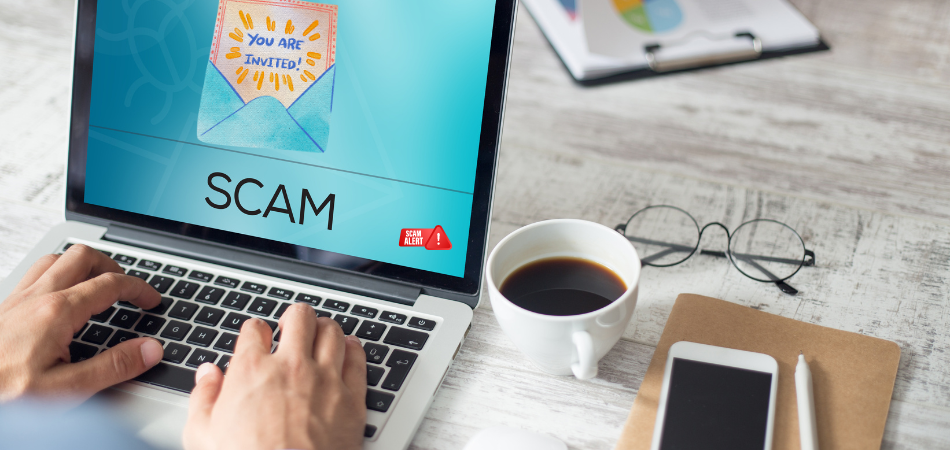Conference invitations often arrive with shiny logos and fancy wording that look convincing. Many people get excited at the thought of joining an international event. But at the same time, some readers may wonder how to stop the scams from conferences invitations?
Stop scams from conference invitations by checking sender emails, verifying websites, confirming speaker identities, and avoiding unsafe payment methods. Real events have secure links, clear schedules, and refund policies. Always search for online reviews. Taking time to verify details protects you from fake offers and financial loss.
Do you want to know the main red flags that expose fake conference invites? Keep reading this article, because here you will find every important point explained in simple steps to help you stay safe from scams.
How to Stop the Scams From Conferences Invitations?
Getting an email about a conference can make you feel excited. It might look real at first with nice logos and messages. But sometimes these invitations are made to trick people out of money. Let’s look at some smart ways to check before you trust them.

Email Check
Many fake invitations come from emails that look almost real. Take time to look closely at the address and small details. If the address uses random numbers or free services, be cautious. Errors in spelling or grammar are also a warning to avoid.
Website Check
Instead of clicking links in the invitation, search for the event name. A proper event will have a neat website with clear information. Fake sites often look rushed, with poor designs and copied images. If things seem unclear or messy, it is a big warning.
Payment Safety
Scam invitations usually demand unsafe payments like wire transfer or gift cards. A real event will always provide proper receipts and safe payment options. Be sure the payment page has security signs before you continue. If not, it is a serious risk for you.
Event Proof
Real events always share important details like proper dates, place, and time. If you’re looking for global events like international business conferences in Canada, the USA, or any other country, you will see full schedules. Scammers avoid sharing clear programs or schedules because they don’t exist. Missing details or confusing text is always a clear sign of lies.
Speaker Proof
A true conference shows speakers with full names and a clear background. Search for them online and check if their profiles are real. Fake events often list names that are made up or unrelated. If you cannot find them, the invitation is not safe.
Refund Rules
Trusted events show clear refund rules on the website or payment page. Fake invitations never explain how you can get money back. Sometimes they use tricky words that confuse people on purpose. If refund details are missing or unclear, avoid making any payment.
Secure Link
Safe websites always begin with “https” and show a lock sign. Scam pages may miss this, or show strange website addresses with errors. Before paying, look carefully at the link in your browser bar. Unsafe links are strong signs that you should not continue.
Review Search
Searching online for reviews can help you avoid wasting money. Real events usually have past reviews or mentions on news sites. Fake ones often leave many complaints or warnings from people scammed. Take reviews seriously because they can save you from big trouble.
Scam invitations keep increasing, and people lose money because of them. Checking small details carefully will protect you from these fake events. Always use your time before you reply or make a payment. Staying careful and smart will keep you safe from these scams.
What Are the Top Red Flags in a Conference Invite?
Conference invites may look like good chances to learn, connect, or expand networks. Some of them, however, are fake and risky. Scammers use false events to steal money or personal information. Spotting warning signs helps avoid traps, so here’s what to look for.
Generic Greeting, Poor Grammar, and Pressure to Act Today
- Generic Greeting: If the message doesn’t use your name and starts with “Dear Participant” or “Dear Friend,” it likely went to many people at once.
- Poor Grammar: Invitations filled with spelling errors or awkward sentences often show the sender is careless or not truly professional about the event.
- Pressure to Act Today: Messages that rush you to pay or register immediately are suspicious since real events give time to think and plan.
Gmail or Look-Alike Domains, Broken Links, Fake Speaker Lists
- Gmail or look-alike Domains: Genuine events use official emails, not free accounts or tricky addresses that slightly copy well-known organizations.
- Broken Links: Clicking links that do not work properly or take you to strange sites is a strong warning sign that the invite is not safe.
- Fake Speaker Lists: Scammers sometimes include names of famous people without their permission to make the invite look more trustworthy and professional.
Wire Transfer, Crypto, or Gift Card Requests
- Wire Transfer: Once you send money through a wire transfer, it cannot be recovered, making it a favorite method for scammers to ask for payment.
- Crypto Payments: Cryptocurrency transactions cannot be reversed, so if someone asks for payment this way, it is almost always a scam.
- Gift Card Requests: A real conference will never ask for gift card payments, so if this request appears, it is a clear red flag.
Staying alert to these warning signs can save you from a lot of trouble. Always double-check details before making payments or sharing personal information. Trust only official websites or known contacts when dealing with event invites. Being careful will keep you safe and confident whenever an invite lands in your inbox.
How Do You Verify the Organizer Fast for Conferences Invitations?
Receiving a new conference invite can make it hard to know if the organizer is genuine. Many scammers create fake invites that look professional. You should not trust every email or website without checking. A few smart steps can help you confirm authenticity quickly, so let’s go through them together.
Company Details
Trusted organizer shares their full company name, office address, and a working phone number on their official site. If any of these are missing or look suspicious, that’s a problem. Always compare the details with other reliable sources before believing the invite.
Website Check
A fake event often uses a weak website with broken links, copied information, or no security lock icon in the web address. Genuine conference sites usually look professional, updated, and have working pages. Taking a minute to explore the site helps reveal the truth.
Online Reviews
Searching the organizer’s company name with “reviews” gives you real feedback from others. Adding the event name plus “scam” often uncovers warnings if it is fake. Positive reviews and mentions in trusted places are signs that the organizer can be trusted.
Past Events
Real organizers usually have proof of past events. You can check for photos, news articles, or social media posts that show the event really took place. If you find nothing, it’s a clear reason to be extra careful with the invite.
Direct Email
Instead of replying only to the new invite, try using a contact or email address from past official events. If your message goes through and confirms the invite, that’s a good sign. A mismatch in addresses is often a red flag.
Verifying the organizer saves you from falling into traps that look professional but are fake. Small checks like searching online, reading reviews, and contacting known addresses can protect you. When in doubt, always take more time to confirm. Staying careful keeps your information and money safe.
How Should You Reply if the Conference Invite Looks Odd?
Sometimes you may get a conference invite that feels a little strange. The details may look incomplete, or the email might seem unprofessional. Scammers often hope people will reply quickly without checking. Here are simple steps you can follow before giving any answer.
Venue Details
When you are unsure, it helps to ask about clear event details. A real event organizer will share the exact venue address and booked dates. Scammers often avoid giving these because they don’t exist. If they cannot share clear answers, that is a strong warning sign.
Refund Policy
Asking about the refund policy and the legal company details is very important. Real events are always clear about how money can be returned. If the organizer avoids the topic or gives confusing answers, it is a red flag. Without this information, your payment will not be safe.
Secure Payment
Before making any payment, check if they can provide a secure link. A true event will always use a trusted payment gateway and send receipts. Scammers will often request money through unsafe methods instead. Never send money if there is no secure system.
Contact Person
Legit organizers always have a clear contact person for questions. Ask for a work email and an active phone number to confirm. If they cannot give one or only share personal emails, be careful. Scammers avoid giving real contacts because they can be traced.
Decline Safely
In cases where you feel unsure, remember that replying to conference invitations should be done with caution, especially if the invite has strange details or asks for personal information. If replies are vague or tricky, it is best to decline and block.
Strange invites should never be trusted without careful checks from you. Asking for clear answers will often expose a scam right away. If the organizer cannot reply properly, protect yourself and step back. Staying alert will save you from many fake offers
Here’s a sample email you can use:
Subject: Quick Details for [Conference Name]
Dear [Name],
I recently received your invitation to the upcoming [Conference Name], and before moving forward, I’d like to request a few important details. Could you kindly provide the following information at your earliest convenience?
- Venue address and booked dates
- Refund policy and legal company name
- Secure payment link
- My role and session details
This information will help me confirm everything is clear on my end before taking the next steps.
Thank you for your time and assistance.
Best regards,
[Your Name]
Do Conference Organizers Provide a Conference Invitation Letter?
Many people wonder if conferences provide official letters to participants. Such letters are often important for travel, visas, or workplace approval. Some organizers offer them right away, while others wait until you confirm registration. Let’s explore how real organizers handle invitation letters in different cases.
Invitation Basics
A conference invitation letter is usually an official document given after registration. It confirms that you are part of the event either as a speaker or attendee. Most real organizers issue it on their letterhead with clear details. Without registration, organizers often will not send one.
Registration First
You need to complete registration before getting a letter in most cases. This shows the organizers that you are serious about attending the event. Once payment or acceptance is confirmed, they issue the document. It helps both sides avoid confusion or fake requests.
Speaker Letters
Speakers usually receive an invitation letter once their session is accepted. The letter often highlights the role, title of the talk, and event dates. Organizers send it to confirm the person’s participation in the conference. Without this letter, many speakers cannot apply for travel visas.
Travel Needs
For people traveling from other countries, the letter is very important. It is often used for visa applications and sometimes for funding support. The document usually includes the venue, dates, and the organizer’s contact. Without it, traveling to the conference becomes very difficult or even impossible.
Trusted Organizers
Yes, most legit organizers issue an invitation letter after you register or are accepted to speak. If someone promises one without clear event details, be cautious. Always check the conference website and reviews before making a payment. Real events never hide how they issue official letters.
Conference invitation letters are common, but they come only after proper steps. Organizers need to confirm your registration or role before sending it. Be careful of offers that skip this process and look strange. Always verify event details before trusting any invitation letter.
Types of Invitation Letters You Can Get From Conference Organizer
Conference organizers send different types of invites depending on your role in the event. Each letter has a specific purpose and tone that shows how you will take part. Some are for general attendees, while others are more formal or targeted. Knowing these types helps you understand what is expected, so let’s go through them one by one.
General Participant
This type of invitation is usually sent to people who will attend mainly to listen and learn. It is often straightforward, sharing event details, schedule, and how to register. The letter usually focuses on participation rather than active involvement, making it simple and clear.
Speaker Invitation
Being invited as a speaker means you are expected to share knowledge, present research, or give a talk. This letter highlights your session details, topic, and audience expectations. It often includes deadlines for submitting slides, along with travel or accommodation information if needed.
Special Guest
Special guest letters are more formal and respectful, recognizing the recipient’s importance or achievements. They usually include details about reserved seating, recognition during the event, or chances to interact with other important people. These invitations are personalized and carry a tone of honor.
Exhibitor Invitation
An exhibitor letter is usually for companies or individuals who want to showcase their products or services. It includes booth details, setup instructions, and what the exhibitor needs to provide. These letters are clear about the benefits of displaying at the event.
Understanding these invitation letters helps you know your role before attending. Each type sets expectations clearly and guides you on what to prepare. Reading the letter carefully is always important to avoid confusion. Every detail mentioned plays a part in your participation.
How Do You Decline a Conference Invitation Politely Without Giving Info?
Getting a conference invite can sometimes feel like an honor, but not every invite is worth accepting. Some may be scams, and others may simply not fit your needs. You can decline without sharing personal information. Let’s see how to do this politely and safely.
Clear Thanks
The first step is to thank the sender for the invite. This keeps your reply polite without revealing personal reasons. A short thank you is enough to show respect. By keeping it simple, you close the conversation politely without more questions.
Direct Decline
It is best to be clear when saying you cannot attend. Avoid giving long explanations about why you are declining. A short statement makes it easier for both sides. This also prevents the organizer from pressing for extra details.
No Personal Data
Never share personal details when you reply to such invites. There is no need to explain your travel plans, health, or work reasons. Some organizers may misuse extra information if you give it away. Keep your reply simple to avoid any risks.
Removal Request
Asking to be removed from mailing lists is very important. This helps stop more unwanted invites in the future. A clear request will show that you do not want further emails. Many professional groups respect this and will remove your address quickly.
Safe Reply
When you are politely declining an invitation, it’s enough to keep your reply short and respectful without going into personal details. If the invite looks suspicious, simply decline and block the contact. This will protect your details and save you from stress.
Declining an invite can be simple when you use polite words. You do not need to give reasons or share private information. A short thank you with a clear decline is always enough. This keeps your reply safe and professional every time.
Here’s a sample you can check out:
Subject: Thank You for the Invitation
Dear [Name],
Thank you for considering me for [Conference Name]. I truly appreciate the invitation and the opportunity to be part of your event. At this time, I will not be able to participate in the conference.
I would also like to kindly request that my email address be removed from your mailing lists to avoid receiving future invitations.
When you are politely declining an invitation, it’s enough to keep your reply short and respectful without going into personal details.
Best regards,
[Your Name]
What if I Already Paid for the Conference Invitation and Now I Suspect a Scam?
Paying for a conference that later feels suspicious can be stressful and worrying. Many scammers take advantage of quick payments and false promises. You still have steps to protect your money and limit the damage. Let’s go through them carefully and clearly.
- Contact Card Issuer: Inform your bank or card provider about the suspicious charge immediately, and share copies of the emails and payment receipts for quick review.
- Dispute Payment: Most credit card companies let you dispute charges made under fraud, so provide clear details with screenshots of emails and suspicious website information.
- Email Organizer: Send one simple refund request to the organizer, and keep a copy of the message; avoid repeated contact after your first email.
- Stop Engagement: Do not continue replying to the organizer after one message, since scammers often try to pressure or trick you into sending more.
- Report Phishing: Use the “report phishing” option in your email inbox, which helps warn others and also reduces future similar scam attempts.
- Alert IT Team: If you use a work email, notify your IT team immediately, so they can secure your account and prevent any other issues.
- Keep Evidence: Save all related emails, payment confirmations, and screenshots in one place, since these may be needed for banks, IT teams, or law enforcement later.
Scam payments can happen quickly, but taking action right away makes a difference. Banks and email providers have tools to fight back against fraud. Keep calm and use them carefully to protect your accounts. Acting fast improves your chances of getting money back.
FAQs About How to Stop the Scams From Conferences Invitations?
When it comes to conference invitations, scammers are always looking for new tricks. Many people lose money because they don’t know the hidden signs. Having common questions answered in one place makes it easier to stay safe. These FAQs will guide you in avoiding conference scams.
Why Do Scammers Target Conference Invitations?
Scammers target conference invitations because people often see them as professional opportunities. Many are quick to reply without checking details carefully. Fake invites are easy to send to thousands of people at once. By doing this, scammers hope to trick even a small percentage into paying.
How Can I Tell If a Conference Fee Is Too High?
Conference fees should always match the type of event and location. If the price seems far higher than similar events, it might be fake. Compare it with known and trusted conferences in the same field. Overpriced fees with no clear breakdown are often a warning sign.
Are Social Media Ads for Conferences Always Safe?
Not every social media ad is safe, even if it looks polished. Scammers can create fake accounts or pages to advertise events. Before trusting such ads, check the profile history and past posts. Real organizers usually have a strong and active social presence over time.
What Should I Do If I Shared My Personal Info With a Scam?
If you already shared details like phone, email, or passport info, act quickly. Change your passwords and watch for strange activity on your accounts. Report the situation to your bank or workplace if needed. Staying alert after a slip can reduce the harm caused.
How Do Fake Organizers Use Stolen Information?
Fake organizers often use stolen details to commit identity fraud. They might sell your information to others or use it for scams. Sometimes, they even create new fake invites using your identity. Protecting your information helps stop them from spreading more scams.
Is It Safe to Join Free Online Conferences?
Free online conferences are not always risky, but you must be careful. Some fake ones ask for personal data instead of payment. Real free events usually partner with known organizations or schools. Always confirm the event source before signing up with your details.
Can Fake Conferences Appear on Trusted Platforms?
Yes, scammers sometimes post fake events on trusted platforms or listing sites. They take advantage of open posting options. That’s why you should still verify with the official organizer website. Even trusted platforms are not fully safe from clever scams.
What Are the Signs of a Fake Conference Schedule?
Fake schedules often look too basic or copied from old events. They may use vague session titles without speakers’ names. Sometimes the dates and times don’t even match normal working hours. A proper event schedule is always clear, complete, and professional.
Why Should I Avoid Clicking Attachments in Conference Invites?
Attachments in fake invites can carry harmful files or viruses. Opening them may harm your computer or steal personal data. Real events usually send clear links to official websites, not random files. It’s always safer to avoid downloading unknown attachments.
How Can I Report a Fake Conference Invitation?
You can report fake invites to your email provider by marking them as phishing. This helps stop the scam from reaching others. You can also share the details with consumer protection groups or local authorities. Reporting makes it harder for scammers to trick more people.
Conclusion
Scammers use fake conference invitations to trick people into losing money or sharing personal information. The best way to stay safe is to check details like the sender, website, payment method, and refund rules. This answers how to stop the scams from conferences invitations?
Protecting yourself from such scams means always thinking twice before clicking or paying. Check reviews, avoid unsafe payment requests, and never share personal data. Stay alert, follow these tips every time you get an invite, and best wishes for safe and trusted conference experiences.










